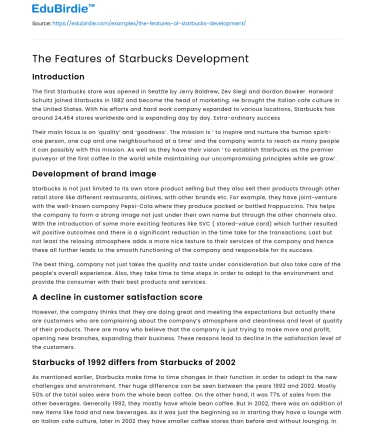Introduction
The first Starbucks store was opened in Seattle by Jerry Baldrew, Zev Siegl and Gordon Bowker. Harward Schultz joined Starbucks in 1982 and become the head of marketing. He brought the Italian cafe culture in the United States. With his efforts and hard work company expanded to various locations, Starbucks has around 24,464 stores worldwide and is expanding day by day. Extra-ordinary success
Their main focus is on ‘quality’ and ‘goodness’. The mission is ‘ to inspire and nurture the human spirit- one person, one cup and one neighbourhood at a time’ and the company wants to reach as many people it can possibly with this mission. As well as they have their vision ‘ to establish Starbucks as the premier purveyor of the first coffee in the world while maintaining our uncompromising principles while we grow’.
Save your time!
We can take care of your essay
- Proper editing and formatting
- Free revision, title page, and bibliography
- Flexible prices and money-back guarantee
Development of brand image
Starbucks is not just limited to its own store product selling but they also sell their products through other retail store like different restaurants, airlines, with other brands etc. For example, they have joint-venture with the well-known company Pepsi-Cola where they produce packed or bottled frappuccino. This helps the company to form a strong image not just under their own name but through the other channels also. With the introduction of some more exciting features like SVC ( stored-value card) which further resulted wit positive outcomes and there is a significant reduction in the time take for the transactions. Last but not least the relaxing atmosphere adds a more nice texture to their services of the company and hence these all further leads to the smooth functioning of the company and responsible for its success.
The best thing, company not just takes the quality and taste under consideration but also take care of the people’s overall experience. Also, they take time to time steps in order to adapt to the environment and provide the consumer with their best products and services.
A decline in customer satisfaction score
However, the company thinks that they are doing great and meeting the expectations but actually there are customers who are complaining about the company’s atmosphere and cleanliness and level of quality of their products. There are many who believe that the company is just trying to make more and profit, opening new branches, expanding their business. These reasons lead to decline in the satisfaction level of the customers.
Starbucks of 1992 differs from Starbucks of 2002
As mentioned earlier, Starbucks make time to time changes in their function in order to adapt to the new challenges and environment. Ther huge difference can be seen between the years 1992 and 2002. Mostly 50% of the total sales were from the whole bean coffee. On the other hand, it was 77% of sales from the other beverages. Generally 1992, they mostly have whole bean coffee. But in 2002, there was an addition of new items like food and new beverages. As it was just the beginning so in starting they have a lounge with an Italian cafe culture, later in 2002 they have smaller coffee stores than before and without lounging. Initially, the company targeted te mid to upper-class people. Later in 2002, they target young and lower-income people. The process was quite simple in the beginning but in the other hand, it was so complex after (2002). Even a few believe that in beginning customers were goes to te Starbucks but now Starbucks goes to the customers.
Some Suggestions
Studies show that customer satisfaction is a very valuable asset for any company. So in order to satisfy customers, Starbucks should serve according to the requirements of the customers, should speed up their services, there should be an efficient use of present resources and technology and should not harm the environment and should concentrate on sensitive issues like cleanliness for better functioning.
References
- Starbucks: delivering customer services, Moon, Y., Quelch J. 2018, Harvard School Business https://hbsp.harvard.edu/download?url=%2Fcourses%2F695818%2Fitems%2F504016-PDF-ENG%2Fcontent&metadata=e30%3D






 Stuck on your essay?
Stuck on your essay?

